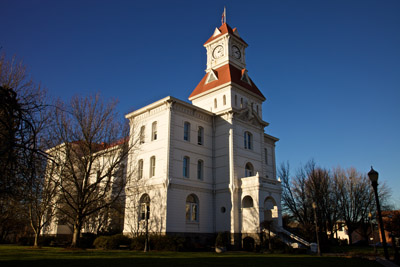Bungling burglars skunked in Corvallis courthouse job
Perhaps thinking the Benton County Treasurer would have treasure in his office, they blew the safe with dynamite — and were disappointed. A month later, having left pawnshop claim stubs lying around camp, they were busted.

The Benton County Courthouse in Corvallis, Oregon, as seen on a clear
winter day in 2009. The courthouse's appearance is barely changed from
how it looked in 1909, when the burglars struck; however, ironically
enough,
in 1909 the county jail was in the courthouse basement, almost
directly under the treasurer's vault. (Photo: Greg Keene/Wikimedia)
[Larger image: 2400 x
1600]
By Finn J.D. John — April 3, 2011
The robbers and burglars who have made Oregon history have not always been the smartest guys on the block. Perhaps that’s just because the smart ones never made history — that is, got caught. But there does seem to be a special thickness about Oregon’s pioneer criminals.
Take, for instance, the D’Autremont brothers, who in 1923 pulled off history’s last great train robbery, but then left a dry-cleaner’s claim check with a name on it at the scene (here's a link to the Offbeat Oregon article about that).
And then there’s Harry Tracy, the last of the Wild West-era outlaws — famously described by Stewart Holbrook as a “garden-variety idiot” — who was known for breaking out of jails. To get good at breaking out of jails, of course, one has to be pretty bad at avoiding getting thrown into them in the first place.
One of the more amusing stories of early-Oregon “morons in the news” (with a tip of the hat to the Bob and Sheri radio show) came out of Corvallis, the seat of Benton County.
Fresh from a jewelry-store burglary
It all started out on the evening of April 4, 1909. Frank Clayton and George Davis, two local fellows in their late 30s, had big plans for the night.
A week or two earlier, Clayton and Davis had successfully burgled a jewelry store in the town of Peoria, just up the river, and gotten away with some very nice things. A journey to a few pawnshops in Portland had turned many of those things into a pocketful of lovely money, although of course hitting a pawn shop with an entire jewelry store’s worth of stuff was bound to raise suspicions, so most of the loot was squirreled away. The robbers had a nice hiding spot underneath a nearby church — the newspaper report says “Oak Grove Church,” which might have referred to the Oakville Presbyterian Church, which is just two miles away from Peoria in a particularly quiet part of the valley. Clayton kept one particularly nice watch for himself, as his personal timepiece.
That watch was no doubt in his pocket on the night of April 4, as he and Davis got ready for their big heist. They were going to break into the Benton County courthouse, blow the door off the treasurer’s vault and help themselves to the treasure. Of course there would be treasure — else why would Benton County need a treasurer?
Dynamite: The subtle burglar's choice
So sometime after midnight, the two brazenly entered the courthouse through the front door, breaking the lock to get in, and then hustled straight to the treasurer’s office.
In the treasurer’s office they arrived at the vault, a large and promising-looking walk-in safe. This was something the boys knew what to do with. They drilled a hole in the door above the combination lock, stuck a stick of dynamite in, lit the fuse and (one assumes) plugged their ears. A couple seconds later, they were in the vault.
As a side note, it’s amazing how much life in Oregon has changed in a little over 100 years. If someone lit off a stick of dynamite in the middle of the night downtown in any Oregon city today, the 911 call center would be flooded with calls from anxious neighbors. But according to the Corvallis Gazette newspaper the next day, “no special significance was then attached to the noise.”
"No treasure? But this is the treasurer's office!"
Deep in the heart of the courthouse, Clayton and Davis were discovering that there wasn’t much special significance attached to the vault in the treasurer’s office, either. They were ransacking the place, throwing ledgers and papers around in a quest for the sacks of money that had to be there but, somehow, weren't.
They did find a little. The treasurer was holding some smallish amounts of cash and some jewelry for safekeeping — the lion’s share of which was a $200 stash belonging to the Woodmen of the World. The two disappointed burglars hastily appropriated these little sums and headed for the banks of the Willamette.
At the river, they climbed into a small skiff which they had stolen earlier that night from one of the local waterfront mills and started a star-lit paddle down the rain-swollen Willamette River — destination Albany and points north.
Reward claimed — by the police chief
A couple weeks went by. A reward was announced: Two hundred dollars for information leading to the thieves. Then the reward was claimed — by the local chief of police, who had journeyed to Portland and arrested Clayton and Davis.
Today, of course, this could never happen. If it’s your job to catch crooks, typically you don’t get cash bonuses from grateful citizens for doing your job. But perhaps Chief Wells was a special case. The Gazette gushed about the job he’d done:
“When the burglary was committed it was thought that no trace had been left by the robbers, but Chief Wells … found a slight clue and this he followed like a born sleuth,” the paper raved. “Chief Wells deserves the highest praise for the really capable manner in which he handled this case. … With only the faintest possible clue he traced the thieves from the scene of the crime.”
"Faintest possible clue" wasn't very faint
What was this “faintest possible clue”? The Gazette doesn’t say. Luckily, its competitor, the Benton County Republican, does: Wells found claim stubs from those Portland pawnshops lying around the burglars' abandoned campsite. Clayton and Davis had doltishly thrown them away before leaving camp the night after their getaway.
Wells arrested the two men on the streets of Portland and hauled them home to Corvallis in chains. The watch in Clayton’s pocket was a nice bonus, because it was easily identified as coming from the Peoria jewelry store. Taxed with that, the two confessed and led the cops to the rest of their stash at Oak Grove Church. They drew sentences of five years each.
Who was N. Solomon?
As for Wells, he duly filed his claim for the $200 and was granted the cash. But what’s especially interesting about this is, there was another claimant too — a fellow named N. Solomon, from Portland.
We know nothing about Mr. Solomon other than his name — which sounds distinctly Jewish. Jewish people, at that time in history, often sought careers in retail shop ownership and moneylending. Is it possible that Mr. Solomon was a pawnshop owner? Was he the guy who whispered to Wells, “Those are the guys, right there,” perhaps as they were walking into his shop to pawn more stolen goods? Maybe he was cooperating with Wells as pawnshop owners cooperate with law enforcement officers, never dreaming that this particular one was moonlighting as a bounty hunter, leaving the city he'd sworn to protect in pursuit of a personal cash windfall.
And if Solomon was the shop owner, was he left holding the bag when all that stolen jewelry was returned to its rightful owner in Peoria?
We’ll probably never know.
(Sources: The Corvallis Gazette and Benton County Republican, March 5-April 15, 1909; clippings collected by Benton County historian Bill McCash)
TAGS: #CRIMES: #larceny #dynamite #crackpotSchemes #outlaw #corruption :: #PEOPLE: #dumbCrooks #schemers #badCops :: #EVENTS: #explosions :: # #irony #fail :: LOC: #benton :: #121










